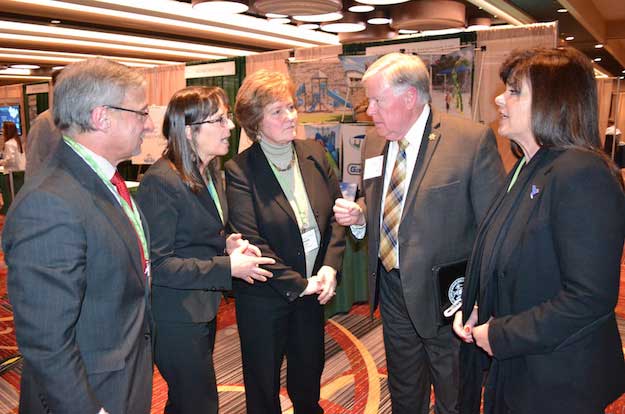Save Ontario Shores leaders tell town officials across NY to be wary of state control over local decisions
Press Release, Save Ontario Shores
NEW YORK CITY – Representatives of Save Ontario Shores, a citizens group opposing the large-scale wind turbine project in Yates and Somerset, warned town leaders from across New York State on Monday that more than 1,500 industrial wind turbines across NYS could have a significant, negative impact on local communities.
During a presentation Monday afternoon at the Association of Towns of New York meeting in mid-town Manhattan, SOS President Pam Atwater told attendees about a statement made by Governor Andrew M. Cuomo during one his recent State of the State addresses, when he talked about a proposed industrial wind project 30 miles off the coast of Long Island. “Not even Superman standing on Montauk Point can see these wind farms,” he said.
“Why should rural residents end up living within 1,500 feet of industrial wind turbines if they don’t want to?” she asked. “The governor should give rural residents the same consideration as well-heeled Long Island residents.”
Kate Kremer, SOS vice president, said there are 30 industrial wind turbine projects on the drawing board in New York.
“If all 30 projects are approved, New York State will be tripling the number of projects and the number of towns impacted. The proliferation is alarming,” she said. “These proposed industrial wind turbines are increasing in height. Because they are taller, they can go in more locations.”
Kremer raised questions about how Article 10 is eroding Home Rule for New York’s 950 towns.
Article 10 gives a siting board the power to approve new, repowered or modified major electric generating facilities in the state.
In the towns of Somerset and Yates, a siting board – with most members appointed by the governor – will be considering the proposal by Apex Clean Energy to install up to 70 industrial wind turbines along the Lake Ontario shoreline. The turbines reportedly would tower more than 620 feet, making them the tallest onshore industrial wind turbines in the United States.
“Once these towers are up, rural New York State will be changed forever,” Kremer said. “We’ve been involved in this process for two years and we still do not know where these industrial turbines are going to be located.”
Kremer also pointed to problems local residents have encountered with the Article 10 process.
“Though it encourages people to comment, there is no mechanism requiring Apex to respond to those concerns, unless directed to do so by an administrative law judge. There’s no process for these comments to mean anything. And there is no threshold, no brake mechanism; even if there are substantial reasons why a location is clearly unreasonable, the Article 10 process will continue.”
Atwater also talked about the emotional toll this kind of debate can have on a community.
“Industrial wind projects are very divisive and cause serious rifts in communities,” she said. “Our towns are largely agricultural. The Town of Somerset is a ‘Right to Farm’ community and historically has been very supportive of farmers. There is a marketing campaign by Lighthouse Wind, with full page ads and billboards, that equates saving family farms with hosting industrial wind turbines. In reality, some farmers oppose the projects and other families are split on the issue.”
Carl Calabrese, SOS consultant and former Town of Tonawanda supervisor, said Article 10 is usurping Home Rule.
“Municipalities have the right to define themselves,” he said. “The Article 10 board, which has five of seven members appointed by the governor, takes local decision-making away from local governments, replacing them with appointees from state agencies.
“Governing towns of any size in New York State is difficult,” Calabrese said. “Town officials are constantly confronted with challenges delivering basic town services. The last thing they need on top of these normal pressures is their divisiveness when out of state corporations can enter New York, bypass town zoning laws, town boards and master plans, and inject an issue that will not only cause discord, but will add significant costs to towns attempting to legally oppose these projects. These are disruptions that town officials do not need.”


































































